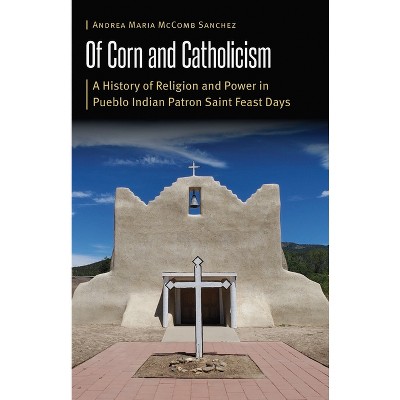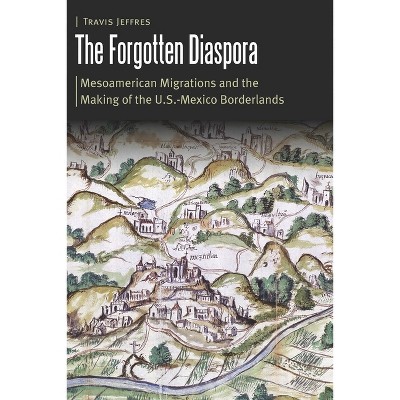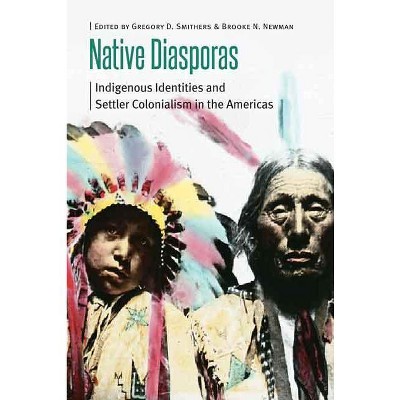Sponsored

Indigenous Sacraments - (Borderlands and Transcultural Studies) by Oriol Ambrogio Gali (Hardcover)
$70.99
In Stock
Eligible for registries and wish lists
Sponsored
About this item
Highlights
- Indigenous Sacraments provides the first study of Indigenous perceptions of the Christian sacraments at the fringes of colonial Spanish America, particularly in the missions established by the Jesuits in northwestern Mexico, central southern Chile, and the Gran Chaco.
- About the Author: Oriol Ambrogio Gali is a research fellow at the University of Nottingham.
- 330 Pages
- History, Latin America
- Series Name: Borderlands and Transcultural Studies
Description
About the Book
Indigenous Sacraments provides the first study of Indigenous perceptions of the Christian sacraments at the fringes of colonial Spanish America, with a specific focus on the missions established by the Jesuits in northwestern Mexico, central southern Chile, and the Gran Chaco.Book Synopsis
Indigenous Sacraments provides the first study of Indigenous perceptions of the Christian sacraments at the fringes of colonial Spanish America, particularly in the missions established by the Jesuits in northwestern Mexico, central southern Chile, and the Gran Chaco. After Jesuit missionaries arrived in these regions between the end of the sixteenth and the early seventeenth centuries, their sacraments came to control every rite of passage, from birth to reaching adulthood to the formation of new families to death. Through the administration of the sacraments, missionaries intended to replace extant Indigenous habits and beliefs with Christian values. The disruptions triggered by such processes raised multiple local reactions, from initial curiosity and incomprehension to rejection, partial acceptance, and ritual imitation. Locals debated the newly introduced rituals and both violently rejected them and developed their own versions, becoming active participants in the sacraments' diffusion. Oriol Ambrogio Gali draws on a range of diverse sources to explore the changing attitudes toward the sacraments and to highlight the cultural and religious evolution of the Indigenous groups living at the fringes of Spanish America. By exploring local perceptions of the Christian sacraments, Ambrogio Gali shows that Indigenous peoples were far from static recipients of Christianity in the Americas.Review Quotes
"This is a good study of Christianity in Indigenous communities on the fringes of Spanish power. It uses many missionary accounts and a wide range of secondary literature in several languages. It is carefully done and provides useful, interesting insights."--P. Grendler, Choice
"Indigenous Sacraments reflects a deep education in church history and missionary history in the New World. Clearly, Ambrogio Gali knows the field inside and out and has immersed himself in the existing scholarship across the Spanish-, English-, German-, and Italian-speaking academic communities. The book is informed by countless well-known missionary chronicles, but also by less-familiar print sources and by substantial archival research."--Sean F. McEnroe, author of A Troubled Marriage: Indigenous Elites of the Colonial Americas
"A major contribution to the history of the Christianization of Indigenous groups at the margins of Spain's colonial American empire. Herein Oriol Ambrogio Gali comparatively studies the role of the Jesuit missions in three peripheral areas of colonization (northwestern Mexico, south central Chile, and the Gran Chaco), each with a plethora of Native ethnicities, distinct languages and cultures, and considerable resistance to religious change. . . . [An] amazing work of scholarship and research."--Ramón A. Gutiérrez, author of New Mexico's Moses: Reies López Tijerina and the Religious Origins of the Mexican American Civil Rights Movement
About the Author
Oriol Ambrogio Gali is a research fellow at the University of Nottingham.Dimensions (Overall): 9.0 Inches (H) x 6.0 Inches (W) x .88 Inches (D)
Weight: 1.44 Pounds
Suggested Age: 22 Years and Up
Number of Pages: 330
Genre: History
Sub-Genre: Latin America
Series Title: Borderlands and Transcultural Studies
Publisher: University of Nebraska Press
Theme: Mexico
Format: Hardcover
Author: Oriol Ambrogio Gali
Language: English
Street Date: December 1, 2024
TCIN: 94168650
UPC: 9781496235770
Item Number (DPCI): 247-43-1457
Origin: Made in the USA or Imported
If the item details aren’t accurate or complete, we want to know about it.
Shipping details
Estimated ship dimensions: 0.88 inches length x 6 inches width x 9 inches height
Estimated ship weight: 1.44 pounds
We regret that this item cannot be shipped to PO Boxes.
This item cannot be shipped to the following locations: American Samoa (see also separate entry under AS), Guam (see also separate entry under GU), Northern Mariana Islands, Puerto Rico (see also separate entry under PR), United States Minor Outlying Islands, Virgin Islands, U.S., APO/FPO
Return details
This item can be returned to any Target store or Target.com.
This item must be returned within 90 days of the date it was purchased in store, shipped, delivered by a Shipt shopper, or made ready for pickup.
See the return policy for complete information.
Trending Non-Fiction

$15.68
Buy 2, get 1 free select books
4.7 out of 5 stars with 182 ratings

$19.31
was $20.98 New lower price
Buy 2, get 1 free select books
4.1 out of 5 stars with 54 ratings

$19.58
MSRP $29.00
Buy 2, get 1 free select books
4.7 out of 5 stars with 11 ratings

$4.59
MSRP $7.99
Buy 2, get 1 free select books
4.8 out of 5 stars with 116 ratings

$6.20
MSRP $10.95
Buy 2, get 1 free select books
4.8 out of 5 stars with 32 ratings

$7.09
MSRP $9.99
Buy 2, get 1 free select books
4.9 out of 5 stars with 45 ratings





